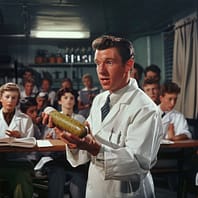Navigating the choppy waters of men’s health, we encounter the whirlpool of Premature Ejaculation (PE), a subject that’s as delicate as it is prevalent. Before diving deep, let’s lighten the load with a bit of humor: dealing with PE might feel like sprinting in a marathon you didn’t intend to finish first. But here’s the kicker—this race is more crowded than you think. So, as we unpack this sensitive topic, remember, you’re in good company, and it’s perfectly okay to share a laugh or two along the way.
What Exactly Is Premature Ejaculation?
Premature Ejaculation could be dubbed the Usain Bolt of sexual encounters: incredibly fast, sometimes awe-inspiring, but not always the desired pace in the bedroom. Medically speaking, PE is defined as ejaculation that occurs sooner than desired, either before or shortly after sexual penetration, causing distress to one or both partners. In simpler terms, it’s like the pop of a champagne cork at the start of a celebration—sometimes it happens before you’ve had a chance to toast. While some view it as a punchline, understanding it is key to demystifying and managing it. So, let’s chuckle at the awkwardness but dive into empathy and knowledge, shall we?
The Prevalence of Premature Ejaculation
The reality of PE might surprise you—it’s as common as accidentally sending a “You up?” text to your boss instead of your buddy. Various studies suggest that about 1 in 3 men have experienced PE at some point in their lives, making it a shared, if not spoken, reality among men across age groups. This debunks the myth of PE being a shadowy outlier. Instead, it’s a spotlight on the shared experiences of many, akin to those universal faux pas we’ve all made—yes, including that ill-fated Instagram like.

The Main Causes of Premature Ejaculation
Diving into the causes of PE is like peeling an onion—there are many layers, and it might make you tear up a bit. On the psychological front, factors such as anxiety, stress, and relationship issues are the usual suspects. Imagine your brain as a well-meaning but overzealous director shouting “Cut!” too early in the scene. Physiologically, things get even spicier. From hormonal imbalances that are more temperamental than a thermostat in a cheap hotel room to issues with neurotransmitter serotonin—think of it as the body’s own traffic light system, sometimes stuck on green. Inflammation or infection of the prostate or urethra can also crash the party, proving that PE’s roots are as varied as the causes of that mysterious check engine light on your car dashboard. Understanding these causes is the first step toward tuning the engine for a smoother ride.
Impact on Mental and Sexual Health
Premature Ejaculation isn’t just a hiccup in the bedroom; it’s like a sudden downpour on your parade, dampening spirits and clouding the sunny skies of your sexual and emotional well-being. For many men, PE can unleash a storm of self-doubt, showering one’s self-esteem with a relentless drizzle. It’s akin to expecting a sunny day only to be met with an unforeseen deluge, leaving you without an umbrella. Relationships, too, can feel the chill, as the pressure to perform brews a perfect storm of tension and misunderstanding. Yet, amidst this tempest, there’s a silver lining: understanding, empathy, and open communication can be the sunshine that breaks through the clouds, promising clearer skies and warmer days ahead.
Navigating Solutions: From Quick Fixes to Long-Term Strategies
Charting a course through the turbulent waters of PE involves a compass pointing towards a variety of solutions, rather than a treasure map leading to mythical “magic beans.” Behavioral techniques, such as the stop-start or squeeze methods, are like learning to sail with the wind—requiring practice and patience but promising smoother sailing with time. Pelvic floor exercises, too, can strengthen the crew needed for a firmer command of your ship.

Pharmacological allies, from topical anesthetics to SSRIs, act as navigational aids, guiding you towards calmer seas. Yet, these medicinal mates should be boarded with a prescription in hand, avoiding the siren call of online elixirs promising the world without a map.
Counseling, whether navigating solo or with your first mate (your partner), can unveil hidden treasures of intimacy and understanding, charting a course towards sexual satisfaction and emotional connection. Often, the most valuable treasures are found beneath the surface. And sometimes these require a dive into the depths of professional guidance and mutual exploration.
Embracing the Journey: A Positive Outlook on Overcoming PE
Embarking on the journey to overcome Premature Ejaculation is less about racing to the finish line and more about enjoying the voyage, with its shared laughter and deeper connections. Imagine PE as an unexpected detour on the road of life—one that offers scenic routes to places of understanding, empathy, and intimacy previously uncharted. By adjusting the sails of perspective, what once seemed like a stormy passage can become a journey illuminated by the stars of hope and resilience. With every step, the voyage towards better sexual health is not a solo expedition but a shared adventure. And you might even find richer treasures there than the destination itself.
Let’s Talk About It: Navigating the Murky Waters of Low Libido(Opens in a new browser tab)
| Relevant Data and Statisticts |
| Global Prevalence: Around 30% of men worldwide experience premature ejaculation, making it one of the most common sexual dysfunctions. |
| Psychological Impact: Approximately 50% of men with premature ejaculation report significant distress related to the condition, affecting mental health and relationship satisfaction. |
| Treatment Seeking: Only about 10% of affected men seek help from healthcare professionals for premature ejaculation. |
| Lifestyle Factors: Studies suggest that physical inactivity and obesity can increase the risk of premature ejaculation, with more than 60% of men with PE being overweight or obese. |
| Relevant Data and Statistics |



